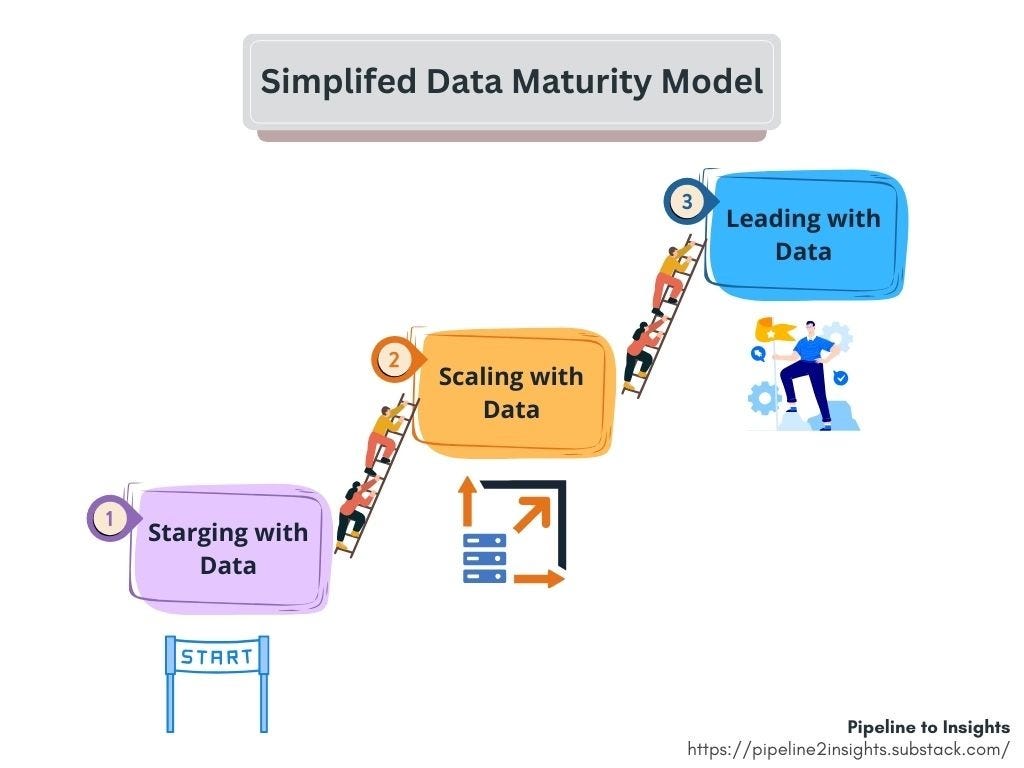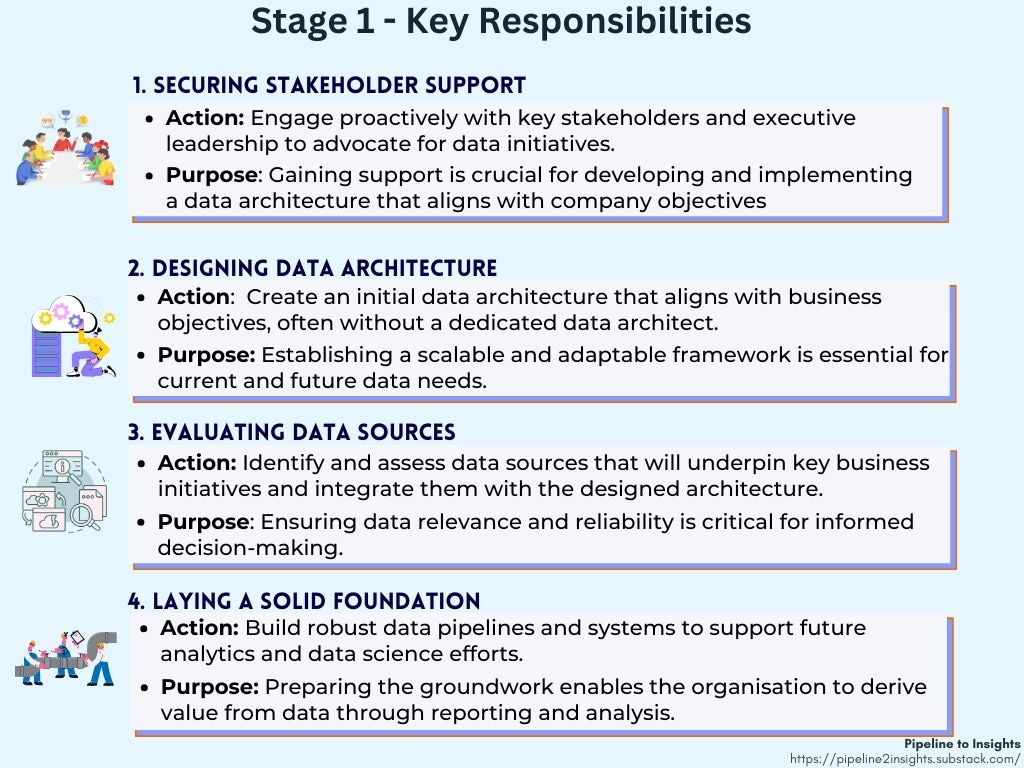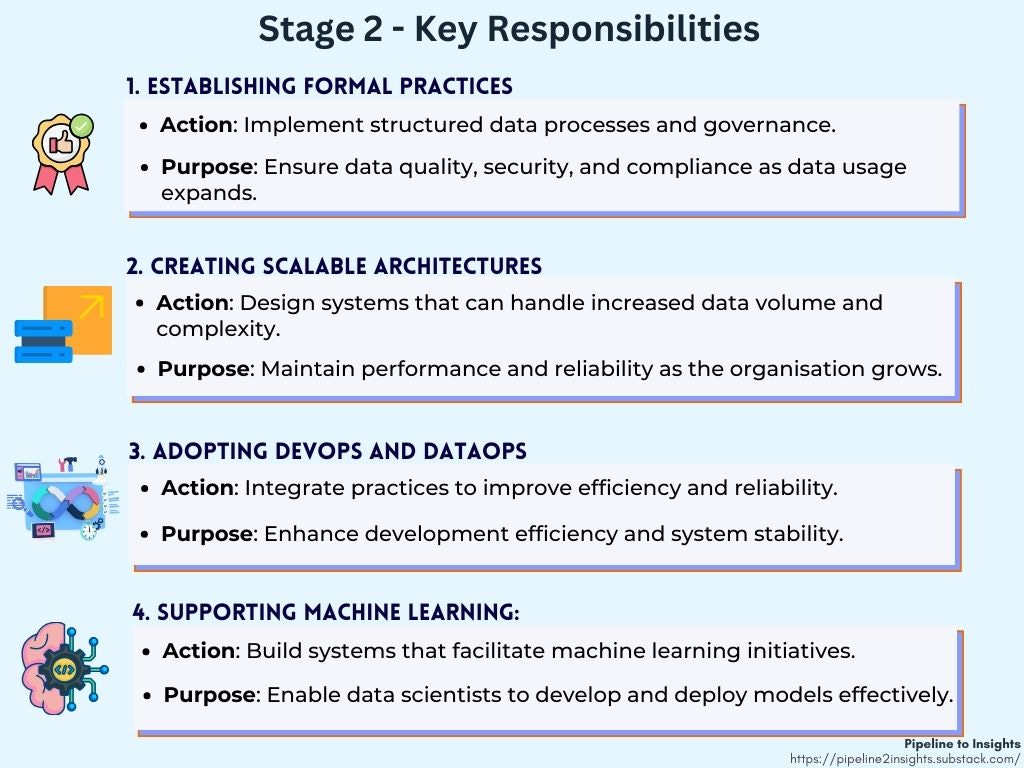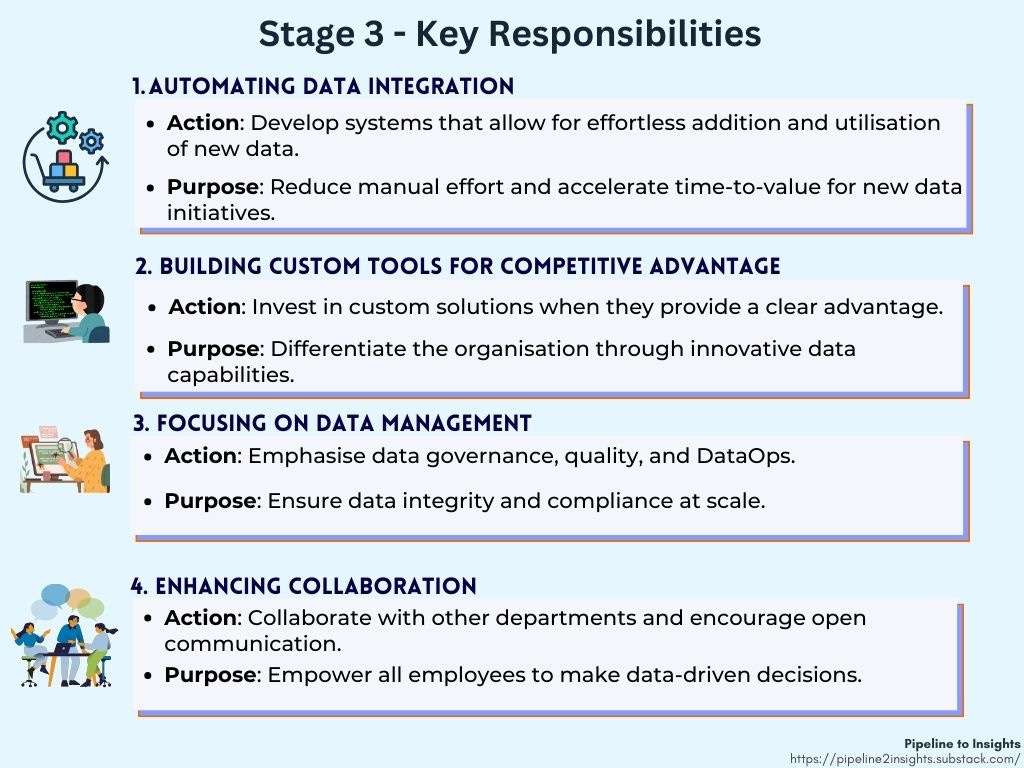What Does Data Maturity Mean for Data Engineers?
Understanding How Data Maturity Shapes the Role of the Data Engineer
What is Data Maturity?
Data maturity refers to an organisation's progression towards higher levels of data utilisation, capabilities, and integration. It's not just about the company's age or revenue but how effectively it leverages data as a competitive advantage.
According to Joe Reis and Matt Housley in Fundamentals of Data Engineering, data maturity is visualised as a ladder that companies ascend step by step, progressing through three stages: starting with data, scaling with data, and leading with data.
In this post, inspired by Fundamentals of Data Engineering, we'll explore how a data engineer's role evolves through these stages and how to navigate the challenges and opportunities at each step.
Stage 1: Starting with Data
At this initial stage, organisations are just beginning their data journey. Goals may be loosely defined or even non-existent, and data practices are just beginning to form. Data engineers at this stage often wear multiple hats, acting as generalists who might also take on roles like data scientist or software engineer.
Tips for Success:
Achieve Quick Wins: Demonstrate early successes to build momentum, but be cautious of creating technical debt; plan to address it proactively.
Foster Collaboration: Engage with various departments to align data initiatives with broader business objectives and avoid working in silos.
Simplify Solutions: Utilise off-the-shelf tools to minimise complexity, reserving custom solutions for areas that offer a clear competitive advantage.
Stage 2: Scaling with Data
As organisations progress, they move away from ad hoc requests to more formalised data practices. The focus shifts to creating scalable architectures and planning for a data-driven future. Data engineering roles become more specialised, with team members focusing on specific aspects of the data lifecycle.
Tips for Success:
Focus on Value-Adding Technologies: Avoid adopting new technologies unless they provide tangible benefits to customers.
Enhance Team Efficiency: Recognise that the data engineering team can be a bottleneck; implement solutions that improve productivity.
Transition to Leadership: Shift from being a technologist to a pragmatic leader who educates others on the practical utility of data.
Stage 3: Leading with Data
In this mature stage, the organisation is truly data-driven. Automated pipelines and systems enable self-service analytics and machine learning. Introducing new data sources is seamless, and data engineers continue to specialise deeply.
Tips for Success:
Avoid Complacency: Continuous improvement is essential to maintain this level of maturity.
Stay focused on business value: Avoid projects that don't align with the organization's goals.
Lessons from Data Maturity Stages
In our experience, we've worked with companies at different stages of data maturity, each with its own challenges and benefits. in our opinion, Stage 1 is often the most challenging, but it offers valuable learning opportunities. At this stage, you need to learn a lot, especially how to communicate effectively with both technical and non-technical stakeholders. Attending meetups and learning from other teams, sharing challenges, and understanding team failures can also be incredibly beneficial.
Check out our previous short posts on how to effectively communicate with stakeholders at different levels:
Mastering Stakeholder Communication for Data Engineers
In a recent discussion between Sol Rashidi, a renowned technology executive with expertise in AI, data strategy, and digital transformation, and Joe Reis in his Data Engineering course on Coursera/DeepLearning.AI, valuable insights emerged for data engineers on determining
Effective Stakeholder Interview Strategies for Data Engineers: Joe and Colleen Conversation on Data Needs
As part of the Data Engineering course on Coursera, Joe Reis, a data engineer, conducts a stakeholder interview with Colleen Fotsch, a Senior Technical Manager, data scientist, and software engineer from the Marketing Technologies team. This conversation offers practical insights into how data engineers collaborate with business teams to create effective data s…
Conclusion
Understanding the stages of data maturity is essential for data engineers aiming to make a meaningful impact within their organisations. By recognising the specific challenges and responsibilities at each stage, data engineers can strategically contribute to their company's data journey, from laying the groundwork to leading with data.
For more detailed information and insights, consider exploring the following resources:
Book: The section 'Data Maturity and the Data Engineer' of Fundamentals of Data Engineering by Joe Reis and Matt Housley
Substack: Joe Reis’s Substack
Course: Data Engineering Professional course on Coursera/DeepLearning.AI
If you found this post helpful, you might also be interested in these previous posts:
Thinking Like a Data Engineer Framework 🤔
As a data engineer, your role involves sourcing raw data, transforming it into valuable insights, and making it accessible for downstream use cases.
The Crucial Midpoint of Data Engineering: Data Transformation
Data transformation is like preparing ingredients for a gourmet dish: You start with raw produce, full of potential but not yet ready to eat. The transformation stage is where Data Engineers become chefs, cleaning, chopping, and blending until everything is just right. The raw data turns into insights-ready information, prepped and plated for analytical…
Join The Conversation!
We’d love to hear about your experience! At what stage of data maturity is your company? What challenges have you faced?🙂
We hope you found this post helpful. If you have any questions, comments, or experiences you'd like to share, we'd love to hear from you!












